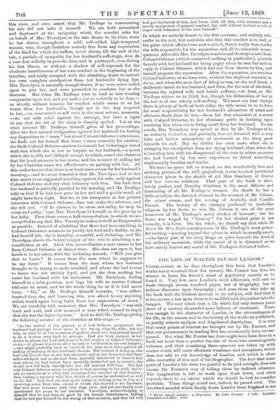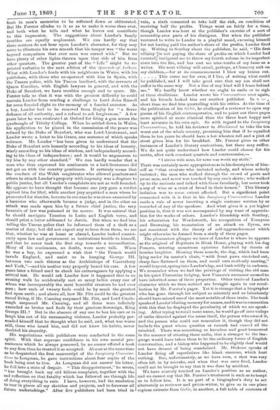THE LIFE OF WALTER SAVAGE LANDOR. 1 COMPLAINING as he does
throughout this book that Landor's works never received their due reward, Mr. Forster has done his utmost to leave his friend's want of popularity exactly as he found it. Very few, save Landor's tried adherents, will care to wade through eleven hundred pages, not of biography, but of tedious discourse upon biography ; and even those who take up the book with the liveliest interest in its subject, will find that it is too severe a tax upon them to be saddled with the author into the bargain. We may admit that a life which fell only sixteen years short of a century demanded some fullness of treatment. There was enough in the character of Lander, in the circumstances of his life, in the nature and in the history of the works he published, to justify minute analysis and lengthened description. It is true that many points of interest are brought out by Mr. Forster, and that our perseverance in reading him has occasionally been recompensed. But what Mr. Forster has done might have been done in a book not more titan a quarter the size of these two unmanageable volumes, and their remaining three-quarters are taken up with matter which will cause alternate weariness stud annoyance, which does not add to our knowledge of Lander, and which is often alike unworthy of him and of his biographer. The fact that some parts of Laudor's life were too painful to be told outright does not excuse Mr. Forster's way of telling them by indirect allusions. The imagination is left to work upon these hints, and often expands them to an extent which we should be loth to consider probable. These things could not, indeed, be passed over. The wretched scandal which finally drove Lauder from England is too
fresh in men's memories to be softened down or obliterated. But Mr. Forster alludes to it so as to make it worse than ever, and both what he tells and what he leaves out contribute to this impression. The suggestions about Landor's family troubles are equally unpleasant. We can hardly say that these matters do not bear upon Landor's character, for they may serve to illustrate his own remark that his temper was "the worst beyond comparison that ever man was cursed with." But we have plenty of other lights thrown upon that side of him from other quarters. The greater part of the " Life" might be reprinted verbatim in the next edition of the Quarrels of Authors. What with Landor's feuds with his neighbours in Wales, with his publishers, with those who co-operated with him in Spain, with the Tuscan police, with his Tuscan landlord, with the servants of Queen Caroline, with English lawyers in general, and with the Duke of Beaufort, we have troubles enough and to spare. Mr. Forster tells us that it was with the greatest difficulty he could restrain Landor from sending a challenge to Lord John Russell for some fancied slight to the memory of a fancied ancestor. As a boy, Landor had to be removed from Rugby for " a fierce defiance of all authority, and a refusal to ask forgiveness." A few years later he was rusticated at Oxford for firing a gun across the quadrangle of Trinity College. When he settled down in Wales, his application to be placed in the commission of the peace was refased by the Duke of Beaufort, who was Lord-Lieutenant, and Landor wrote a letter to his Grace-, one sentence of which speaks volumes. Mr. Landor "has been given to understand that the Duke of Beaufort acts honestly according to his ideas of honesty, wisely according to his ideas of wisdom, and independently according to his ideas of independence ; and it would be ungenerous to try him by any other standard." We can hardly wonder that a man who thus expressed his sentiments to a lord-lieutenant did not get on with the country gentlemen. It certainly seems that the conduct of the Welsh magistrates who allowed poachers and others to attack Landor's property with impunity was a disgrace to public justice, but all Landor's complaints are not as well founded. He appears to have thought that because one jury gave a verdict against him for libel, while another jury acquitted a man whom he prosecuted for slander, because in one case he was cross-examined by a barrister who afterwards became a judge, and in the other an attack was made upon him by a future chief justice, the very fountain of law was poisoned at its source. It was natural that he should castigate Taunton in Latin and English verse, and should print a letter addressed to Jervis. But when we find him telling the Tuscan police that he informed them of a theft as a matter of duty, but did not expect any redress from them, we see that, whether he was at home or abroad, Landor looked consistently upon law and government as institutions hostile to himself, and that he never took the first step towards a reconciliation. Many of his sentiments, no doubt, were mere talk. When he was a boy, he expressed a wish that " the French would invade England, and assist us in hanging George III. between two such thieves as the Archbishops of Canterbury and York,"—and his mother very properly boxed his ears. A few years later a friend used to check his extravagance by applying a critical test. He would ask Landor how it happened that in an evening walk he accidentally met so many ladies every one of whom was incomparably the most beautiful creature he had ever seen ; how each of twenty fools could be by much the greatest fool upon earth ; and above all, how Mr. Pitt could be the greatest rascal living, if Mr. Canning surpassed Mr. Pitt, and Lord Castle reagh surpassed Mr. Canning, and all three were infinitely exceeded as brutes and fools by their gracious Sovereign, King George III.? But in the absence of any one to box his ears or to laugh him out of his unreasoning violence, Landor probably persuaded himself that he thought what he said, and, what was worse still, those who heard him, and did not know his habits, never doubted his sincerity. His negotiations with publishers were conducted in the same spirit. With that supreme confidence in his own mental pre eminence which he always possessed, he no sooner offered a book to any firm than he treated it as accepted. Almost at the same time as be despatched the first manuscript of the Imaginary Conversa tions to Longman, he gave instructions about four copies of the book being sent to him. As Longman did not answer his letter, he fell into a state of despair. " This disappointment," he wrote, "has brought back my old bilious complaint, together with the
sad reflection on that fatality which has followed me through life of doing everything in vain. I have, however, had the resolution
to tear in pieces all my sketches and projects, and to forswear all future undertakings." After five publishers had been tried in vain, a sixth consented to take half the risk, on condition of receiving half the profits. Things went on fairly for a time, though Landor was hurt at the publisher's exercise of a sort of censorship over parts of his dialogues. But when the publisher ventured to write to Laudor in a playful mood, excusing himself for not having paid the author's share of the profits, Landor fired up. Writing to Southey about the publisher, he said, " His first villainy [in not paying the share of profits on which Landor had counted] instigated me to throw my fourth volume in its imperfect state into the fire, and has cost me nine-tenths of my fame as a writer. His next villainy will entail, perhaps, a Chancery suit ou my children,—for at its commencement I blow my brains out.
This cures me for ever, if I live, of writing what could be published, and I will take good care that my son shall not suffer in the same way Not a line of any kind will I leave behind me." We hardly know whether we ought to smile or to sigh at these ebullitions. Landor wrote his Conversations over again, and his friends looked him out another publisher. Ina -,v-., short time we find him quarrelling with his critics. At the time of the publication of his Gebir, he challenged a reviewer to open any poems of his English contemporaries, and to point out three pages more spirited or more classical than the three least happy and least accurate in his own epic. So with regard to the Imaginary Conversations, he told his reviewer in Blackwood to take the ten worst out of the whole seventy, promising him that if he equalled them in teu years he should have a hot wheaten roll and a pint of stout given him for his breakfast. Mr. Forster gives us other instances of Landor's literary contentions, but these may suffice. We do not quite understand how Landor could choose for his motto, after such constant quarrels and controversies,































 Previous page
Previous page